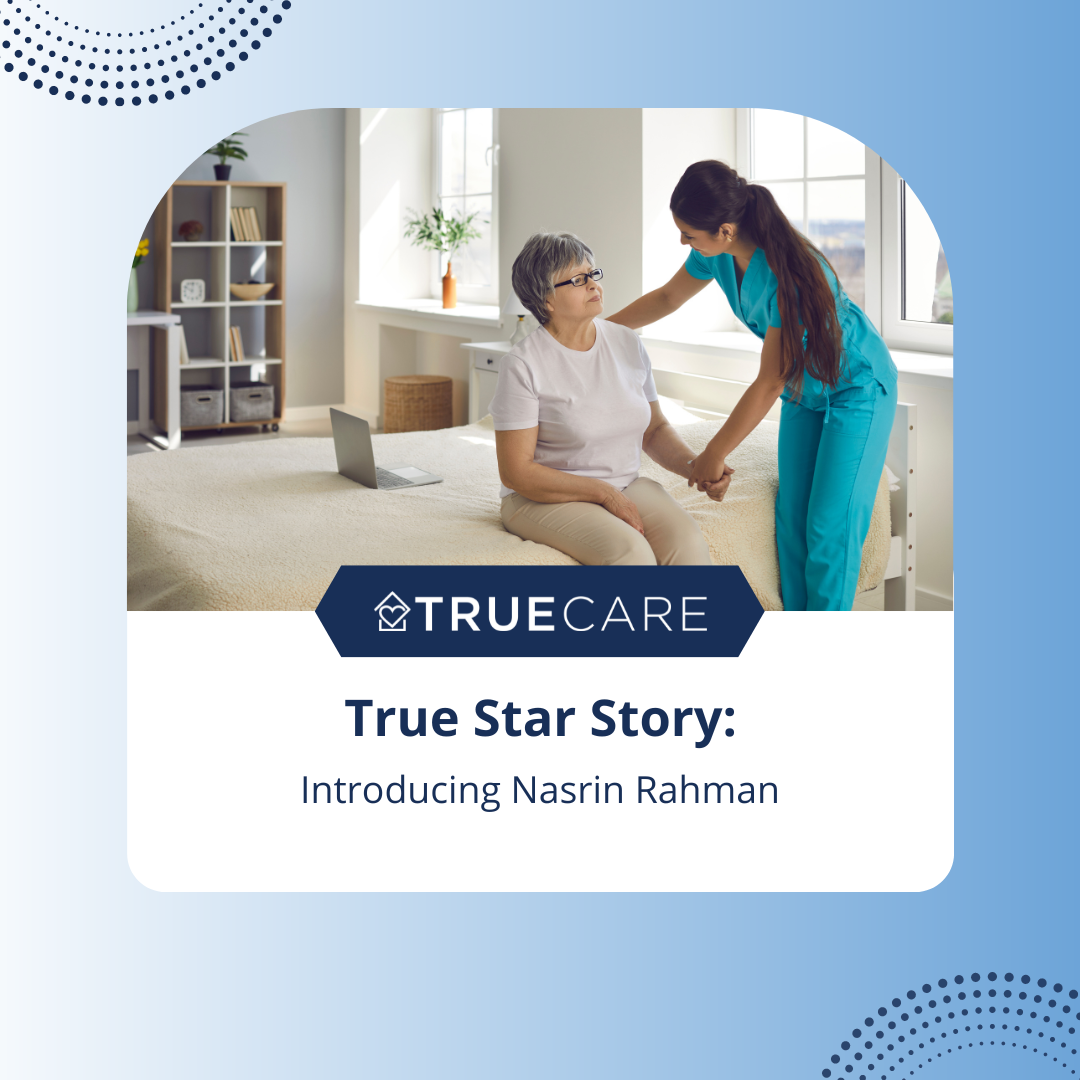Being a Home Health Aide (HHA) to seniors or people with illnesses or injuries that require assistance means more than taking care of medical tasks and helping out around the house. It is a relationship that can have a significant influence on the patient’s quality of life. HHAs have the ability to establish profound relationships with clients and families. At True Care, our HHAs make it a point to get to know our patients, to spend time with them, and to create healthy bonds that support recovery and a high quality of life.
True Care’s very own Nasrin Rahman has had her own set of life-changing experiences as a HHA. When she first heard about becoming an HHA, Nasrin was curious. She needed a job that provided her flexibility in her schedule. Working as an HHA seemed like it might be a good fit for this reason. Beyond the flexibility the work afforded her, Nasrin discovered that she loved the sense of satisfaction she felt when helping her clients. Being able to truly help someone, and even put a smile on their face, made the work of being an HHA feel especially rewarding.
Being an HHA allows you to help others and make a difference in their lives. Read along as we break down some of the rewards and challenges of being an HHA, with Nasrin’s input on what it truly means to fill this valuable role.
What are the benefits to being an HHA?
The benefits if being an HHA include but are not limited to:
- More Flexibility: One of the greatest benefits of a career in home care is having more control over your schedule. Once you have a caseload, you develop the schedule according to what works best for you and your clients. You have greater control over your work hours and days off than you might working in a typical day job.
- Cultivate Resilience: In home care, you work independently. Typically, that means you are alone with your patient forcing you to become resourceful when facing a challenge. Having this much autonomy in your work life leads to the development of stronger communication and problem-solving skills.
- Build Relationships: When working in home care, you find yourself making a tremendous difference in the lives of your client(s). When you are spending so much one-on-one time with a client, you can’t help but develop a close relationship with them. Essentially, you become almost like a member of their family because of the deep connection you make with them.
- Make a real difference: Whether caring for an elderly patient, helping someone recuperate after an injury, or assisting someone managing a chronic condition, you are empowering them to do it in the most comfortable setting for them. Given the choice of a care setting, most people prefer to be at home when they are ill or injured. As the person responsible for allowing this to happen, you will sense their appreciation and gain personal satisfaction.
For Nasrin, the most rewarding aspect of her work is being able to help her clients in any way she can. Knowing that she can assist them throughout their day makes her feel full of life. What makes Nasrin great at her job is her ability to understand where her clients are coming from. If a conflict arises, by remaining calm and patient, Nasrin can diffuse almost any difficult situation. By listening to her client, she can resolve the issue without the client feeling distressed or uncomfortable.
HHA Challenges & Advice
While the benefits of home care are many, being an HHA or a caring professional of any kind can also come with its challenges. HHAs work with people of all ages experiencing a range of medical conditions that may be painful. Some challenges an HHA may face include:
- Working in a situation where a client's suffering cannot be completely relieved.
- Suffering emotional losses when terminally ill clients pass away.
- Performing around the clock care, which means long shifts lasting 8 hours or more.
- Caring for clients that have dementia, or other mental health issues, and that may say or do unpleasant things as a result of their condition.
- Caring for a client who cannot talk, which in some cases can contribute to feelings of isolation.
On the positive side, HHAs often build friendly relationships with clients’ families and find satisfaction in providing assistance. HHAs may serve as a stable fixture for some clients, providing companionship to individuals who rarely leave the home and may have little social contact.
For Nasrin, one of the main challenges she’s learned to overcome as an HHA is navigating difficult emotions with her clients. Seeing her clients experience agitation can be difficult, but over time Nasrin has learned to help her clients understand, relax, and calm down when tensions run high. Of course, there is the odd situation in which a client doesn’t cooperate or refuses to try and understand her position. Luckily though, these types of situations are few and far between, and most of the time she is able to take care of her client’s needs with ease and grace. She looks forward to many more years working with clients at True Care.
Thinking of becoming an HHA?
For others considering becoming an HHA or entering the caring professions, Nasrin has the following advice: although there are days where it might be challenging, working as an HHA is worth it. Clients bring with them a lifetime’s worth of stories and wisdom, and you can have a great time both getting to know and care for someone else. To learn more about becoming an HHA and the application process, contact True Care today. We’ll be happy to help you kickstart your life-changing journey.




